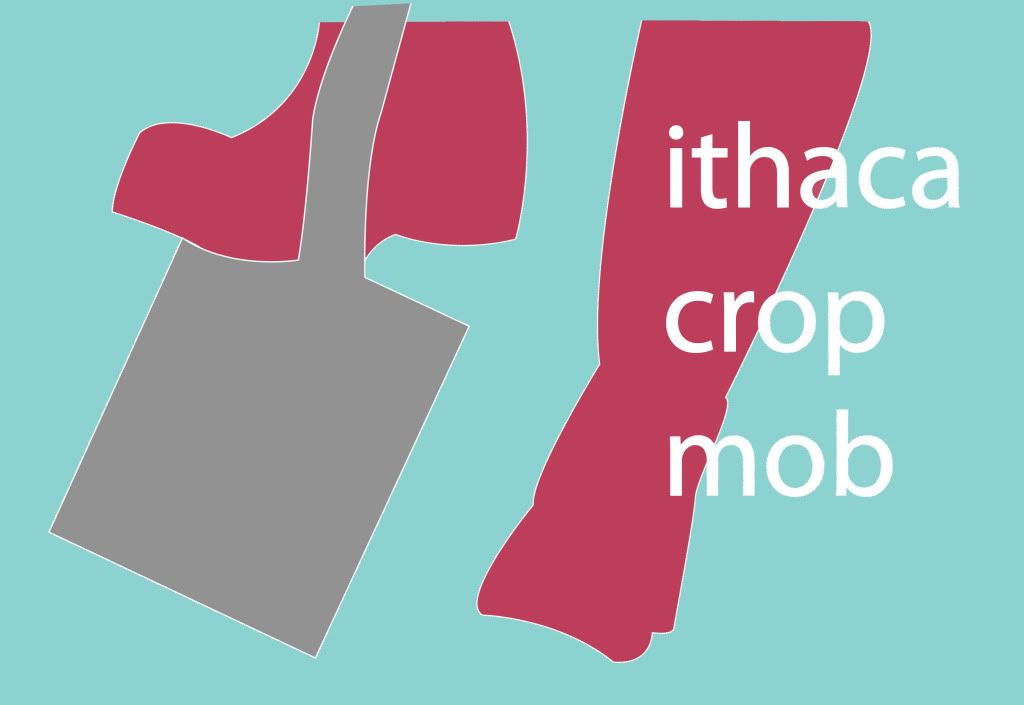Water has been the theme of this season- either too much of it or too little. In the past couple of weeks we have had rain relief -- a couple of inches in one particularly generous day, and ample showers throughout for most of the area -- but this summer's drought isn't quite out of mind. Katie, one of the crop mob coordinators, sent this email to her CSA members that summed up the situation well:
"As you may be aware, this growing season has been more challenging than most so far. We started off the season with sooo much rain, too much to plant things in, meaning that direct seeded crops went in the ground later than usual, and the transplants carefully tended in the greenhouses got leggy and stressed before they could go in the ground. Many of the Spring crops (hakurei turnips, radishes, spinach) as well as some of the summer crops (first plantings of beets and carrots)didn't make it. The wet ground dried hard and crusty and the baby roots couldn't stretch out (sorry to make it sound so dramatic!). And of course, until just the past couple of days, we've had so much heat and so little rain. Turns out vegetables need water, steadily. The farms have been able to keep on on irrigating some of the crops, but some of them aren't set up for irrigation and/or the water supplies aren't able to cover everything - choices have to be made."
Our July crop mob at Sweet Land farm happened right at the end of the drought, and we got to see how our organic farmers deal with dry-weather woes.
Irrigation. As Evangeline explained, it's especially important at two stages of a plant's life. The first is when it's born; the second is at maturity. If a sprouting seed isn't irrigated and the soil is dry, it will die. When a plant flowers, signaling maturity, water given to that plant can multiply your harvest, whether it's a fruit like tomatoes or a flower like broccoli heads.
Sweet Land's irrigation is supplied from a farm right across the street- they trade their entire season's water for a CSA share for their well-owning neighbors. Sharing at its finest! Though they are blessed with neighborly generosity, there is still not enough water to cover everything at all times- there is a limit. Drip irrigation tubes must be moved from place to place, connected and disconnected. Choices are made constantly.
The lack of rain had one benefit- weeds don't grow very well without it. But they still exert competition on the good guys, who don't grow as well either! Weeds grew all along where the irrigation tubes were placed and hardly anywhere else.
Weeders of all ages!
Can you identify a baby carrot? A baby beet? We started out weeding close together so we could help each other distinguish the weeds from the veggies.
Beets and weeds in close quarters
Freed beets!
As our weed-identifying confidence grew, so did our range!
Paul and Evangeline grew their potatoes in between buckwheat "insectaries" as a particularly innovative pest control measure. Predatory wasps love buckwheat flowers and will flock to them. These wasps, while harmless to humans, prey on potato beetles that can infest a crop of potato plants. Sown at the same time, the buckwheat will flower just when the potato beetles tend to find and set up camp on the potatoes. Situating the potatoes in between the buckwheat lets the predatory wasps control your potato beetles for you.
The buckwheat looked beautiful!
We enjoyed a picnic lunch in the shade. Gotta keep the mobbers watered, shaded and well-fed too!
How can you tell what Sweet Land did to handle the drought worked? The farm has been able to feed its members as usual--and then some. Evangeline and Paul even generously offered us vegetables to take home!
Evangeline gave us a tour of the farm, with particular attention to the U-Pick flowers, the chickens, and the parts of the farm most obviously affected by the dry weather. Why put energy and space into flowers? It's part of Sweet Land's holistic goal to not only be a productive farm, but a beautiful one. That beauty means a lot to their CSA customers too.
Chickens are a crucial part of this farm's ecosystem. Through them, unusable vegetable scraps get recycled into tasty eggs and precious fertilizer.
The leeks looked pretty stoic out there in the field. Being non-fruiting veggies, the leeks have had to tough it out without much water so other, more vulnerable vegetables could have enough. A corner of these dust-mulched leeks had been blessed with a temporary water leak, and they were double the size of the thirsty ones.
This block was never planted because of the wet spring conditions, and is now crusted and dry- no good for planting either!
At this time, the fall crops have gone in- greens, brassicas, root veggies, fast-growing herbs- and we've seen some rain, so the fall and winter seasons are looking like they'll turn out well. Next crop mob we'll be weeding the newly-germinated and well-rain-fed weeds at Solana Farm on the Ithaca/Danby border on Sunday, August 21st. Come crop mob with us!


















No comments:
Post a Comment